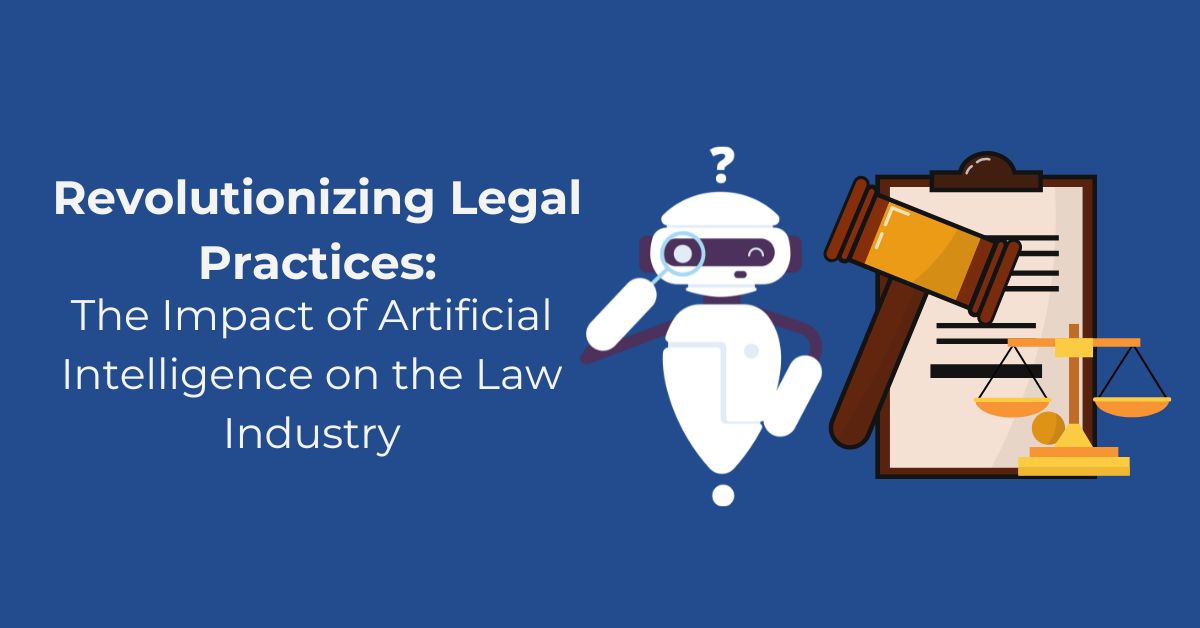How Artificial Intelligence is Revolutionizing the Legal Industry
In today’s rapidly evolving digital landscape, artificial intelligence (AI) has emerged as a transformative force across various industries. Among these, the legal profession is undergoing a significant metamorphosis, thanks to the integration of AI technologies. With the keyword ‘artificial intelligence and law’ featuring a high search volume, it’s evident that this subject is attracting substantial interest. In this blog post, we will delve into how AI is reshaping the legal sphere, offering a mix of efficiency, precision, and innovative solutions to age-old challenges.
Understanding Artificial Intelligence in Law
Artificial intelligence refers to the simulation of human intelligence processes by machines, especially computer systems. These processes include learning, reasoning, problem-solving, perception, and language understanding. AI technologies can be broadly classified into two categories: narrow AI, which is designed to perform a narrow task (like voice recognition or web searches), and general AI, which is capable of performing any cognitive task that a human can do.
In the legal sector, AI is employed to tackle tasks that traditionally required significant manual effort and time. These tasks include legal research, document review, contract analysis, and even predicting case outcomes. Legal AI applications utilize machine learning algorithms, natural language processing (NLP), and data analytics to carry out these tasks more efficiently and accurately than traditional methods.
Automation and Efficiency Improvements
One of the most notable impacts of AI on legal practices is automation. Legal firms are leveraging AI to automate routine tasks, freeing up valuable time for lawyers to focus on more strategic activities. For instance, AI-powered tools can quickly analyze vast amounts of legal documents, identifying relevant information within minutes instead of hours or days.
This automation not only enhances efficiency but also significantly reduces the likelihood of human error, ensuring higher accuracy levels in legal processes. Furthermore, AI algorithms continuously learn and improve over time, which means their productivity and efficiency grow, leading to ongoing enhancements in legal services.
Case Management and Legal Research Enhancement
AI technologies are also transforming case management and legal research—two critical yet time-consuming aspects of legal work. AI systems can perform data-driven analysis that offers strategic insights for better case management, while AI-based legal research tools provide quick access to pertinent case law and statutes.
For legal research, AI-powered applications like natural language processing can comb through vast legal databases, pulling relevant cases and documents based on key phrases and legal precedents. This capability allows attorneys to gather comprehensive case insights efficiently, improving case preparation and strategy development.
Case Studies in AI Legal Applications
- Khaitan & Co’s use of Ask.Kai
Challenges and Ethical Considerations
Despite its potential, the integration of AI in law is not without challenges. One significant concern is AI bias—where algorithms may inadvertently favor certain outcomes over others due to biased training data. This bias can have serious implications in legal judgments, raising fair trial concerns.
“Ensuring AI systems are transparent and fair is crucial to building trust in AI technologies within the legal sector.”
Another pressing issue is data privacy. As AI systems require vast quantities of data to function optimally, ensuring that personally identifiable information (PII) is safeguarded becomes paramount. Legal professionals must navigate these challenges carefully, balancing innovation with ethical responsibility and data protection regulations like the GDPR.
The Future of AI in the Legal Profession
The role of artificial intelligence in law is still in its nascent stages, with future developments promising even more groundbreaking advancements. Experts predict that AI will play an increasingly pivotal role in areas such as legal citation analysis, jury verdict predictions, and personalized legal services.
Moreover, AI is expected to facilitate more collaborative roles for attorneys, where practitioners work alongside AI technologies to deliver superior legal services. This partnership between humans and machines promises to unlock unprecedented levels of innovation, efficiency, and capability in the legal profession.
Looking ahead, legal education may also transform, with curricula integrating AI literacy to prepare future lawyers for the changing landscape. As AI technologies evolve, so too will the demand for legal professionals who understand both the legal intricacies and the technical aspects of AI.
Conclusion
As we have explored, artificial intelligence is more than just a buzzword in the legal industry—it is a transformative force that is redefining how legal services are delivered and perceived. From enhancing efficiency through automation to providing valuable insights through data analysis, AI is paving the way for a new era in legal practice.
The future of law is one where AI and human expertise go hand in hand, driving innovation and accessibility in legal services. As legal professionals and AI technologies continue to adapt and evolve, the possibilities for the future are truly exciting. Readers are encouraged to stay informed and engaged as we navigate the ever-changing intersection of artificial intelligence and law.
Call to Action: Stay Updated with the Latest in AI and Law!
For more insights and updates on how AI is impacting the legal world, subscribe to our blog and newsletter. Share this post with your colleagues and friends on social media, and join the conversation about the future of law and technology.







